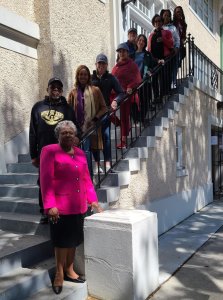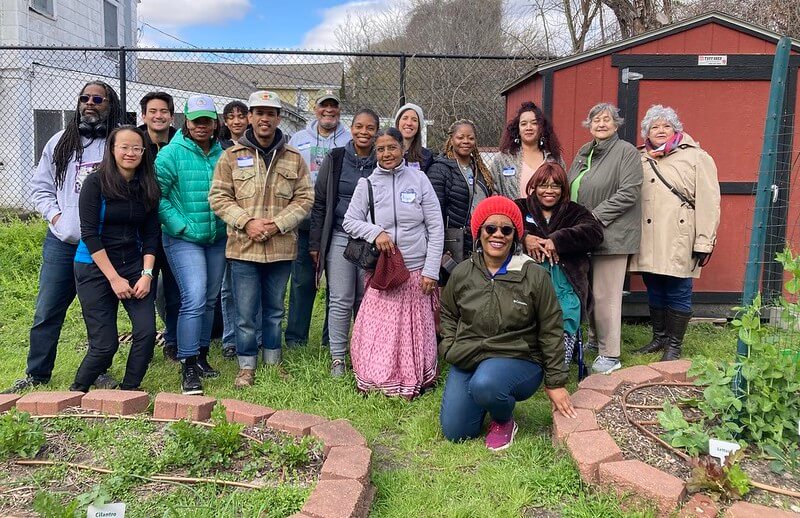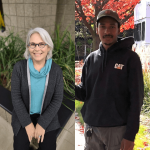Teresa Davis
Houston, Texas | May 23, 2023
“There is a real need to celebrate our small and great victories. A lot of this work is heavy, it can be heavy. And because people who do this work or at least the folks that I know that do this work… they own this work. And so it’s important to celebrate not just the small and big wins, but also to celebrate ourselves.”
Transcript
00:00:04 Renée Mazurek Hi, and welcome to River Network’s July Meet your Network. This month we’re trying something a little bit different that we hope you’ll enjoy, hearing from our network members in their own voice. My name is Renée Mazurek. I use she/her pronouns, and I live and work in Asheville, NC on the traditional lands of the Eastern Band of the Cherokee.
At River Network, we recognize and acknowledge the Native peoples, the first protectors of the lands and waters around us to keep salient the history of colonialism and recognize the continued presence and contributions made by indigenous peoples. Learn more about the lands you live and work on at native-land.ca.
River Network envisions a powerful and inclusive movement that ensures abundant clean water for all people and nature to thrive. We believe joy and hope for our planet flows through our rivers.
I am one of the Resilient Communities’ Managers, and as part of the Resilient Communities Team, my work intersects with several projects across our network; and today I’m excited to talk about one of them—Flow Funding, an exploration of trust-based philanthropy to support efforts of climate justice.
From the support of a generous donor, River Network launched the climate Justice Flow Fund Circle in 2021. Our team invited four flow funders to determine and provide financial support to recipients in their own community. These are folks working on projects that address the impacts of climate change and promote social and water equity. For the last two years, these four flow funders have chosen individuals and organizations who received a cumulative total of $200,000. These distributions were given without an application, without a selection process or any additional required agreements outside a general agreement encouraging the recipient to leverage this gift and to network and build relationships with others in the Flow Fund Circle.
I had the honor of talking with Teresa Davis, one of our Flow Funders, and while I could introduce Teresa and read her bio, instead, I’m going to let Teresa take it away…
00:02:27 Teresa Davis Hi, Renee, and thanks for having me today.
My name is Teresa Davis. I’m a mother, an entrepreneur, lifelong learner, and indeed a Flow Funder. I currently reside in Houston, TX, but I’m a native of Michigan and a graduate of Eastern Michigan University. I say I’m a very altruistic, creative, positive individual who truly understands the meaning and value of servanthood. I got involved in the environmental justice and social movement back in 2017 post Hurricane Harvey. This is where I oversaw disaster recovery throughout nine counties in the Southeast Texas area, providing crisis counseling and connecting folks to what we call direct services. This was a part of a major federally funded initiative. After this program ended in 2018, I joined the Coalition for Environment, Equity, and Resilience, also known as CEER, as Director of Government Affairs and Community Engagement.
I later served as CEER’s Interim Executive Director before resigning in December of 2022. During my time at CEER, I really continued to build and establish relationships across the state of Texas. The main goal here was to, let’s say, empower people, specifically People of Color, meaning Black, brown and tan communities where we create a space for them to sit at the decision-making table when it comes to local environmental justice issues. We focused on things like clean water, clean air, and resiliency, just to name a few, but also state level advocacy.
00:04:16 Renée Mazurek I love that, and I love hearing about your time before you were at CEER. It was when you were at CEER when I had the opportunity to meet you. And I know that you’ve since moved on from CEER. Can you tell me a little bit about what you’ve been doing recently?
00:04:32 Teresa Davis I’m so glad you asked what I’ve been up to. As a servant leader, you don’t just lay down your toolbox. You find opportunities to lend out your tools and make deposits where most needed. For example, in 2021 I established COLIA, Communities of Love in Action, as a 501C3 nonprofit organization that builds and shapes other community-based organizations by way of transformative education. Furthermore, closing the environmental justice and social inequity gaps. I’ve actually been doing this for a very long time, way before establishing COLIA. For years I’ve been pouring out my own talents, tools, and time into other individuals and organizations. I’ve been lending myself to Westry Mouton Project since 2018, building and creating service programs and community outreach strategies. In addition to leading on fundraising for this CBO, in 2022, in partnership with TSU [Texas Southern University] I was able to get funding for Purple Air monitors. And in 2023, I created and led a successful social media campaign for Westry Mouton Project, announcing Purple Air monitoring in partnership with TSU. They’ve agreed to provide ongoing air monitoring tech support.
I’m currently creating a community Water Quality Guild in Jefferson County. This is in response to a water justice educational workshop that I conducted earlier this year. I’m also eager to create an air quality task force that will be focused on air pollution.
I’ve partnered with Rice University professors on climate change workshops. I’ve also started to outline the development of a climate change curriculum in partnership with community to introduce to Houston ISD [Independent School District] in the near future. Just recently, I met with Texas A&M to discuss my involvement and contributions toward the Department of Energy five-year project.
As a flow funder, I constantly stay in the loop, making myself available to educate communities and to support all of my Flow Fund Recipients. This looks like providing actual training, showing up for an event, or participating hands on as a speaker or a flow funder guest.
Since I now have the time to solely focus on COLIA, I’ve also joined ecoAmerica as a climate ambassador and representative for the state of Texas, focus on climate, health equity. I’ve attended a few conferences so far this year. Also, one in particular was a global health conference. This is where I met some amazing health professionals who are eager to engage and learn more about the impacts of climate on health.
I just simply stay engaged as much as possible. Considering my own capacity and availability to serve and offer support, of course I’m human. And I just care about people.
00:07:41 Renée Mazurek That’s amazing, and I love that you bring up building and keeping and tending to these relationships. That’s one of the reasons why you’re such a strong Flow Funder. And so, I want to just shift gears a little bit and talk a little bit about the River Network Climate Justice Flow Fund Circle and how you became involved.
00:08:05 Teresa Davis Thanks for that question, Renee. It was really a great day when I got a chance to meet with you in the Zoom box and really get more acquainted with this new concept. But how it came to me initially was, I received an e-mail and then the e-mail—it was full of such poetic justice, if I may—where it was recommending me as the person to lead in this space. And so I was quite intrigued. I really didn’t have all of the details, so I didn’t know exactly what the circle, the Flow Funding Circle was about. Just the new concept of trust-based philanthropy alone was something that was… philanthropy itself was near and dear to my heart.
Again, I received an e-mail one day, and it came from another environmental justice leader that said I have the right person for you. I believe that Teresa Davis is the individual to lead in this space and to assist you with accomplishing your goals, and then they gave this long list of reasons why.
And just knowing that somebody else had that type of belief and faith and my ability to make a contribution to this new Flow Funding Circle gave me the impetus and the courage to even have that talk with you and say, yeah, I want to hear more. I want to learn more.
00:09:35 Renée Mazurek The River Network Climate Justice Flow Fund Circle is a community of people and organizations that are working with flow funds distributed by River Network, inspired by Flow Fund philanthropy principles. As the initiator, River Network sought people and projects that are typically outside of the traditional proposal-based grant making structures. River Network, as the initiator, looked for leaders in the community like you, Teresa, to help us to understand where these dollars need to go and help us to examine the privilege and power inherent in the typical philanthropic efforts.
So as a Flow Funder, you get to support Flow Fund Recipients in your community. And, I would love for us to shift gears and talk more about your experience as a flow funder. Can you tell me more about your experience as a Flow Funder and why you indeed did say yes?
00:10:32 Teresa Davis My experience as a Flow Funder has been absolutely humbling. It’s been outside of the box, so to speak, and outside of the mainstream thinking when it comes to philanthropy. It’s been full of charity and hope, giving and altruism…and a real sense of community capacity building. I actually feel like a gatekeeper, Renée. It’s like the called and the chosen and the trustworthy one. Somebody who’s entrusted to sow and water seeds on good soil, so to speak, for others to reap a meaningful harvest.
I’m continually inspired with all the creativity and new ideas and more ways to increase the scope of work and just share this new trust-based philanthropy concept.
00:11:26 Renée Mazurek So why is disrupting mainstream philanthropy so important?
00:11:32 Teresa Davis Well, it’s important because there’s a lot of research out there that highlights how community-based organizations are underfunded. People of Color led organizations are underfunded. And then we have this group of individuals who are taking from their own lack and trying to support a community need or close a community gap because they don’t have the ability, whether it be the educational support or the financial support to even create their own 501c3 or 501c4.
So there’s a recent report that came out this March of 2023 titled Examining Disparities in Environmental Grantmaking. Doctor Taylor and Doctor Blundell of Yale University led this particular research. And just to kind of give an overview of the abstract, the report actually examines the environmental grantmaking practices of like 220 plus foundations where they actually distributed 30,000 grants that totaled $4.9 billion, and this was distributed over three years, of course. It reveals the disparities in environmental grantmaking related to geography, the size of the grantees, revenues, sex and race, ethnicity of the grantees, the chief executive, and the type of organization being funded. It also found in this particular study that environmental justice organizations and those that focus on People of Color were at a disadvantage in the number of grants received and the grant dollars that were awarded.
Now again, this particular report also highlights numerous issues when it comes to grantmaking and/or funding People of Color or People [of Color]-led organizations. And it talks about the funding networks and environmental organizations. It talks about the issues around funding for environmental organizations. And then it also discusses the implications of funding, or the lack thereof, for People of Color led organizations.
And just to throw out some numbers… They highlighted that 56% of the foundations funded primarily focused on People of Color, which was less than 10% of the grants, and the grant dollars actually go to the People of Color organizations. And then it also highlighted that female organizations were more likely than male led organizations to focus primarily on People of Color. Only 46% of the foundations supported environmental justice organizations and People of Color led environmental justice organizations obtained about 71% of grants and about 77% of the grant dollars. So overall, the report argues that foundations… they really need to start looking at the inequities in their own practices and develop much more equitable grantmaking processes.
And for me, that sent a real message because all of my Flow Fund Recipients are People of Color and they’re actually Women of Color. And so to know that there’s this recent research out there that’s highlighting all of these inequities when it comes to grantmaking really just kind of helps to tell to tell us like there’s this strong sense of urgency for this trust-based philanthropy that River Network and the Flow Funders are leading on and, and a part of. Because the dollars aren’t going to these recipients, the dollars aren’t getting where they need to go, and as a result of that, folks, the inequities and the disparities are continuing to play a major role in recovery, in education, and just overall quality of living.
00:15:57 Renée Mazurek Thank you so much for sharing all of those statistics. Those are really, really important. And I think I got chills when you said, you know, after all of that and then saying all of your recipients are People of Color, and specifically Women of Color. I just really appreciate that, I appreciate you. Tell me more about all of these wonderful recipients of yours?
00:16:21 Teresa Davis Now this gets me really excited. I mean, this is what today is all about, right? Highlighting my Flow Fund Recipients. I am super excited to talk about all four of my 2023 Flow Fund Recipients. Let’s just jump right in.
First, we have. ACTS, Achieving Community Tasks Successfully, CEO and founder Bridgette Murray. This organization is based in Harris County, and ACTS focuses on climate change through the lenses of water quality and air quality. More specifically, as of 2022 and 2023, Flow Fund recipient, ACTS is focusing on Project 11, which is taking a look at the impacts of the Houston Ship Channel. And they’re leading on raising the flag to deepen and widen this Houston ship channel. ACTS is simply confronting the Port of Houston Authority and U.S. Army Corps of Engineers, and they are engaging the Environmental Protection Agency on this issue as well to highlight the impacts on the environment and communities’ health.
Next is Donna Thomas, CEO and founder of Fort Bend Houston Environmental. This grassroots community-based organization is based in Fort Bend County and the focus is on climate change and air quality. Donna has been in this fight for a few decades now. Most recently, they’ve done some promoting on a local radio station. They’re hosting meetings with Fort Bend County officials, and they’re planning to establish Purple Air monitors in eight cities and towns throughout Fort Bend County. What I’m really excited to share with you all… that Donna Thomas and Fort Bend Houston Environmental was, by invitation only, able to participate in a meeting with the Environmental Protection Agency, EPA, this year; and they were able to contribute to the Clean Air Act discussion. So again, I’m super excited to support Fort Bend Houston Environmental as a Flow Fund recipient of 2023.

The RN Climate Justice Flow Fund Circle pictured with Leona Tate on the steps of the school that she integrated in the Lower Ninth Ward. Photo by Renée Mazurek.
Next is Leona Tate Foundation for Change. I really can’t get through all of what I would like to share about this particular organization because it just goes back before I was even born, looking at the courage in which Leona Tate exemplified as a six year old little Black girl in New Orleans that really helped to desegregate schools in the 1960s. I mean, her story is amazing. You all, she also happens to be a very humble individual. In this particular work, she was able to go back to the very same school that she attended beginning in the 1960s, and she purchased this school and she has now taken this idea and vision, making this school a Prevost center, serving as a mixed-use facility that focuses solely on community, more specifically educating community, which also encompasses an exhibition space dedicated to the history of New Orleans public school desegregation as well as civil rights and restorative justice. I just totally see Doctor Leona Tate as a storyteller in it’s rarest form. We talk about authentic narratives. This is a story that should be told, and we need to tell it because our children need to keep this narrative alive. I couldn’t be more excited and honored to support this work and to have the Leona Tate Foundation for Change as a 2023 Flow Funder Recipient.
Last but not least, we have Miss Delores McGruder, an individual with a vision and passion for our youth who is a community activist in Houston’s Fifth Ward Historical District. And as an activist, she just sees a need to close the gap on where and how, and with lack thereof, when it comes to bringing our children to the table and talking about climate change and water quality, water justice, and youth education and literacy. And so out of this vision and dream, she developed the Mustard Seed Program. She’s been using her own pocket change to bring this program together and to talk to the youths and their parents about climate change. She’s been sharing all of the education she’s received and learning about this very new and unfamiliar topic within the People of Called community as well as just pouring back into our youths and just trying to close that gap. And while she doesn’t yet have a 501c3 established, the Mustard Seed is just as valuable and significant as any organization that’s established, and it’s simply because she’s putting the time and her resources into making this a reality for so many children and their parents. It is an honor and privilege to support and award Miss Delores Magruder and the Mustard Seed as a 2023 Flow Fund Recipient.

Ms. Delores McGruder, one of Teresa Davis’s flow fund recipients, leads community members on a garden tour. Photo by Teresa Davis.
00:22:33 Renée Mazurek That’s amazing. And I mean, the next question I have is, you know, what makes you feel joyful in this work? And I think it’s a great lead-in, because…I can hear the joy in your voice when you’re talking about her. Is there anything else that keeps you inspired and energized to continue doing this work?
00:22:54 Teresa Davis I think that it’s the delivery of hope. It’s one thing to believe that you will arrive at the intended outcome or to reach your goal. It’s something different to witness accomplishing those goals and seeing the difference that it makes when you have accomplished something. And so there’s a delivery of hope that’s transferable through the entire journey through this entire process that keeps me inspired. And it’s also encompassed by these acts of altruism that’s on display and the actual giving that takes place. You show up as a Flow Funder and you’re meeting with these recipients, and you are acknowledging the work that they’re doing, the work they’ve done, and then you end with: “I want to support, I want to flow into you.”
And so, to see that actual giving takes place serves as an extension and true definition of what philanthropy means. The origin of philanthropy is all about charity and the well-being of others and unity. So, I am just consistently energized by the philanthropy in action.
00:24:16 Renée Mazurek I have just one final question. If you could share an important lesson or piece of wisdom you’ve picked up along the way with other folks doing this work, what would it be?
00:24:28 Teresa Davis I thought about this quite a bit. And because I’ve had the opportunity to meet and talk with so many individuals, there is a real need to celebrate our small and great victories. A lot of this work is heavy, it can be heavy. And because people who do this work or at least the folks that I know that do this work… they own this work. And so it’s important to celebrate not just the small and big wins, but also to celebrate ourselves. It’s all about taking a moment to celebrate.
00:25:14 Renée Mazurek Thank you so much for talking with me today, I always enjoy our conversations. I really just admire you… who you are and what you bring to this work. So thank you.
There it is my friends. My conversation with Teresa Davis. The insights she shared are invaluable. We are so grateful to have her as a member of the Flow Fund Circle and the larger River Network.
You can find out more about Teresa on our website’s Flow Funding page or reach out to Teresa on LinkedIn. Both are linked in the audio transcript below the recording. Follow River Network at www.rivernetwork.org. Become a member and join the over 2,000 individuals representing more than 800 organizations working to protect and restore rivers and drinking water.
Thanks for listening in and we look forward to connecting with you again soon. May you find joy and hope in the rivers and waters near you.
About
Teresa Davis is a servant-leader and philanthropist at heart, with a long-standing dedication to supporting communities affected by various forms of social and environmental injustices. She holds a Master of Arts degree in Educational Psychology from Eastern Michigan University, where her research centered on addressing the unique challenges faced by at-risk and under-served populations. With an unwavering commitment to lifelong learning, Teresa actively cultivates personal growth, continuously expanding her knowledge and acquiring new skills. Her dedication to self-improvement serves a greater purpose: creating opportunities that enable her to educate and empower others. By staying at the forefront of current developments and embracing new concepts like Trust-Based Philanthropy, Teresa remains poised to make a lasting impact in her mission to uplift, support, and advocate for marginalized communities. Teresa is purpose driven. She enjoys composing music, producing short films & video narratives, traveling, and cooking. Teresa is adventurous, creative, and always willing to explore new ideas.







